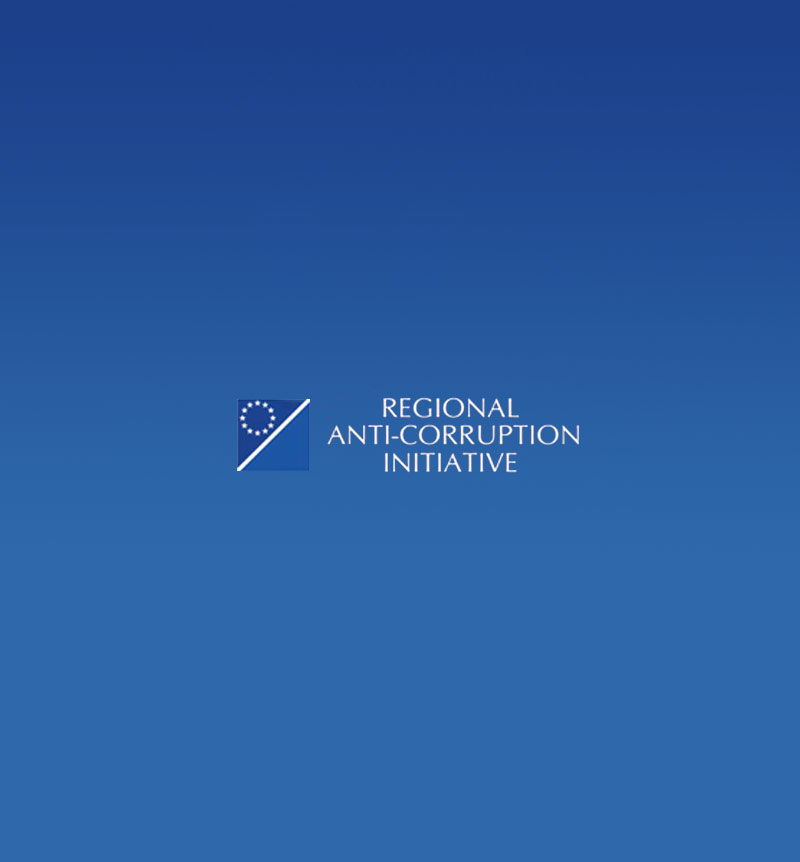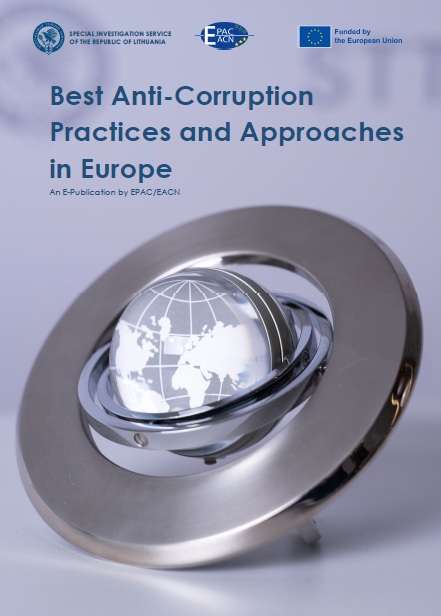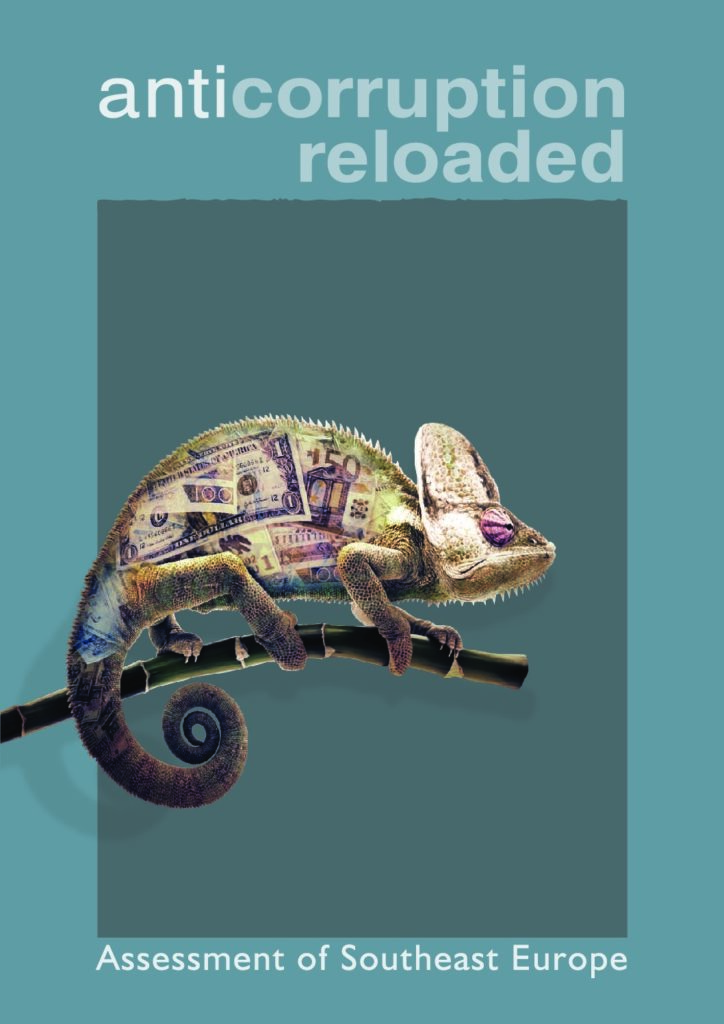This E-Publication by EPAC/EACN „Best Anti-Corruption Practices and Approaches in Europe“ is based on joint efforts of the EPAC/EACN members. The Project working group collected information about the best practices and approaches to tackle corruption and fraud over all Europe, which was provided by participants in the reports and presentations. This information was systemized and formed a basis for preparation of this e-publication, which contain the best and most relevant examples of anti-corruption practices under all 6 topics that have been presented throughout the project.
Publisher:European Partners against Corruption (EPAC) and European contact-point network against corruption (EACN)
Year of Publishing: 2025
Language: English
This report analyses the risks entailed by the misuse of fiscal transfers from central to local governments in nine SEE countries (Bulgaria, Croatia, Hungary, Romania, Albania, Bosnia and Herzegovina, North Macedonia, Montenegro, and Serbia). Such transfers are typically a tool of equalisation policies seeking to offset disparities in the economic development of territorial units. When the general rule of law is compromised, however, intergovernmental transfers can be susceptible to corruption risks which undermine the effectiveness of these transfers and lead to misallocation or diversion of funds. The distortions created by clientelistic transfers are at risk of being further exacerbated by rigged local government procurement
Publisher: Center for the Study of Democracy
Authors: Daniela Mineva, Dr. Tihomira Kostova, Dr. Mihály Fazekas, Viktoriia Poltoratskaia
Year of Publishing: 2023
Language: English

The Regional Good Governance Public-Private Partnership Platform (R2G4P), coordinated by the Center for the Study of Democracy, Bulgaria aims to strengthen the rule of law in Southeast Europe (SEE) through delivering shared anticorruption solutions between state institutions and civil society. In 2022/2023, the initiative identified the legal and procedural improvements needed to transform asset declarations into an effective corruption prevention tool for the region.
Authors: Daniela Mineva – Center for the Study of Democracy; Dr. Mihály Fazekas – Government Transparency Institute, Viktoriia Poltoratskaia – Government Transparency Institute, Kristina Tsabala – Center for the Study of Democracy
Year of Publishing: 2023
Language: English

The goal of the Handbook is to map a variety of anti-corruption practices in EU Member States (MS) that have proved to be useful in solving problems related to corruption, and which can inspire similar initiatives elsewhere. For this purpose, one good anti-corruption practice either established or innovative, with positive impact aspirations in each EU Member State was selected, and clustered into eight types of anti-corruption approaches. The Handbook is structured along these identified types.
Authors: Oksana Huss, Mike Beke, Jan Wynarski, Brigitte Slot
Year of Publishing: 2023
Language: English

Compendium of anticorruption strategies and plans
Member organizations were requested to describe anticorruption strategies from a national point of view on and not just their direct role in them, but of course highlighting it providing insights and first-hand considerations.
Coordinator: Italy – National Anti-Corruption Authority – ANAC
Co-Coordinators: Albania – Ministry of Justice, Greece – National Transparency Authority -NTA; Working group members: FR, RO, MA, RS, MK, MD, BR
Year of Publishing: 2023
Language: English
The first SEE Good Governance report, published by the R2G4P anti-corruption initiative, focuses on two of the most testing governance vulnerabilities in the region: public procurement and governance of state-owned enterprises in the energy sector.
This Infographic was produced as a part of the regional R2G4P project, implemented by 14 partners including the Regional Anti-corruption Initiative, coordinated by the Center for the Study of Democracy. The project is funded by Iceland, Liechtenstein and Norway through the EEA and Norway Grants Fund for Regional Cooperation.
Publisher: Center for Study of Democracy
Year of Publishing: 2022
Language: English
The energy sector presents one of the main systematic governance problems leading to significant losses of public wealth and providing inroads for illicit finance and foreign authoritarian influence in the region, as noted in the first SEE Good Governance report by the R2G4P anti-corruption initiative.
This Infographic was produced as a part of the regional R2G4P project, implemented by 14 partners including the Regional Anti-corruption Initiative, coordinated by the Center for the Study of Democracy. The project is funded by Iceland, Liechtenstein and Norway through the EEA and Norway Grants Fund for Regional Cooperation.
Publisher: Center for Study of Democracy
Year of Publishing: 2022
Language Versions: English
The energy sector presents one of the main systematic governance problems leading to significant losses of public wealth and providing inroads for illicit finance and foreign authoritarian influence in the region, as noted in the first SEE Good Governance report by the R2G4P anti-corruption initiative.
This Infographic was produced as a part of the regional R2G4P project, implemented by 14 partners including the Regional Anti-corruption Initiative, coordinated by the Center for the Study of Democracy. The project is funded by Iceland, Liechtenstein and Norway through the EEA and Norway Grants Fund for Regional Cooperation.
Publisher: Center for Study of Democracy
Year of Publishing: 2022
Language: English
The comparative analysis of SEE‑9 public procurement and energy SOEs’ management practices in the first R2G4P SEE Good Governance report reveals continuing corruption and state capture risks, despite the emergence of good practices.
Based on the in-depth review of the public procurement systems and the management of energy SOEs, several key policy recommendations were outlined. This Infographic was produced as a part of the regional R2G4P project, implemented by 14 partners including the Regional Anti-corruption Initiative, coordinated by the Center for the Study of Democracy.
Publisher: Center for Study of Democracy
Year of Publishing: 2022
Language: English
This Report was produced as a part of the regional R2G4P project, implemented by 14 partners including the Regional Anti-corruption Initiative, Regional Cooperation Council, and coordinated by the Center for the Study of Democracy. The project funded by Iceland, Liechtenstein and Norway through the EEA and Norway Grants Fund for Regional Cooperation aims to implement shared anti-corruption and good governance solutions in Southeast Europe through innovative practices and public-private partnerships.
Publisher: Center for Study of Democracy
Year of Publishing: 2022
Language Versions: English
This Manual was developed as a part of the regional R2G4P project, implemented by a 14 partners including the Regional Anti-corruption Initiative, Regional Cooperation Council, and coordinated by the Center for the Study of Democracy. The project funded by Iceland, Liechtenstein and Norway through the EEA and Norway Grants Fund for Regional Cooperation aims to implement shared anti-corruption and good governance solutions in Southeast Europe through innovative practices and public-private partnerships.
Publisher: Center for Study of Democracy
Year of Publishing: 2022
Language Versions: English
This Manual was developed as a part of the regional R2G4P project, implemented by a 14 partners including the Regional Anti-corruption Initiative, Regional Cooperation Council, and coordinated by the Center for the Study of Democracy. The project funded by Iceland, Liechtenstein and Norway through the EEA and Norway Grants Fund for Regional Cooperation aims to implement shared anti-corruption and good governance solutions in Southeast Europe through innovative practices and public-private partnerships.
Publisher: Center for Study of Democracy
Year of Publishing: 2022
Language Versions: English
This Manual was developed as a part of the regional R2G4P project, implemented by a 14 partners including the Regional Anti-corruption Initiative, Regional Cooperation Council, and coordinated by the Center for the Study of Democracy. The project funded by Iceland, Liechtenstein and Norway through the EEA and Norway Grants Fund for Regional Cooperation aims to implement shared anti-corruption and good governance solutions in Southeast Europe through innovative practices and public-private partnerships.
Publisher: Center for Study of Democracy
Authors: M. Fazekas, P. Horn, A. Czibik, B. Toth
Year of Publishing: 2022
Language Versions: English
Over the past five years, Southeast Europe has led the world in strengthening whistleblower rights. Thanks to the hard work of policy-makers, activists, journalists and citizens, every Western Balkan country now has a whistleblower protection law on the books. All of these laws contain most European and international standards.
So, whistleblowers have nothing to worry about, right? Wrong.
Three ongoing retaliation cases show that the region has a long way to go before employees and citizens can report crime and corruption without the fear of prosecution, firing and other reprisals. The cases also reveal that strong laws are one thing. Actual protection in real life situations is something else. Read more in the first 2020 Issue of the SEE WhistleWire edition.
Publisher: Southeast Europe Coalition on Whistleblower Protection
Year of Publishing: 2020
Language Versions: English
Data Analysis of Opinion Survey about Whistleblowing and the Protection of Whistleblowers. This is the first comprehensive survey on whistleblowing and the first public insight into this topic in South East Europe.
Publisher: RCC, SEE2020 Strategy Series
Authors: M. Worth, S. Dreyfus, E. Baillie, S. Carey, S. Wolfe
Year of Publishing: 2017
Language Versions: English
GAP’s Study Shows Protections for World Bank Whistleblowers Fall Short of Best Practices: The study’s findings can be succinctly summarized: “The Bank’s Whistleblower Policy, Rules and Guidance are not transparent and are out-of-step with 21st Century international best practices, treaties and the universal rights of whistleblowers (in a number of important ways).”
Publisher: Government Accountability Project (GAP)
Authors: Keith Henderson
Year of Publishing: 2016
Language Versions: English
This report provides a civil society view of the state of corruption and hidden economy in Southeast Europe. It has been prepared by the SELDI Secretariat (Center for the Study of Democracy) after extensive consultations with SELDI partners.
Publisher: Southeast Europe Leadership for Development and Integrity (SELDI)
Year of Publishing: 2016
Language Versions: English
The report analyses three broad areas of anti-corruption work, including anti-corruption policies and institutions, criminalisation of corruption and law-enforcement, and measures to prevent corruption in public administration and in the business sector. The analysis is illustrated by examples of good practice from various countries and comparative cross-country data.
Publisher: OECD
Year of Publishing: 2016
Language Versions: English
This legislative toolkit aims at providing guidance on good examples for regulating conflict of interest, possible pitfalls and common mistakes in conflict of interest regulations and comprehensive conflict of interest regulation, as well as other questions for practitioners from countries in transition. This manual focuses on
administrative officials, as well as on parliamentarians and judges. The toolkit attempts to resolve an often present dilemma among practitioners on whether there should be any differences in approach to regulating this issue for lower level and higher level civil servants; political appointees; or judges.
Publisher: CoE
Year of Publishing: 2015
Language Versions: English
This report provides a civil society view of the state of corruption and anticorruption in Southeast Europe. It has been prepared by the SELDI Secretariat (Center for the Study of Democracy) after extensive consultations with SELDI partners.
Publisher: Southeast Europe Leadership for Development and Integrity (SELDI)
Year of Publishing: 2014
Language Versions: English


















